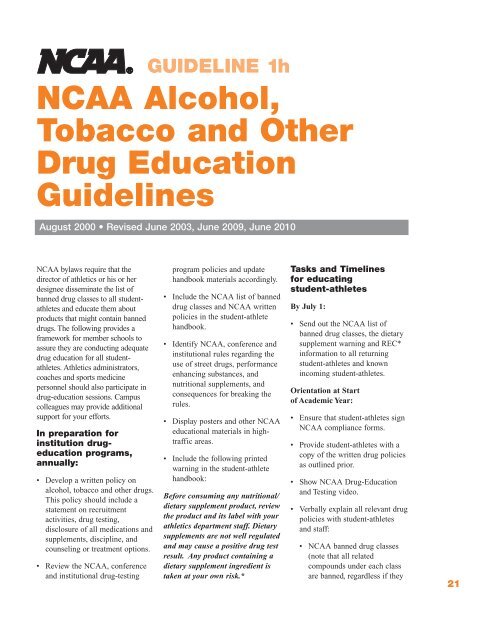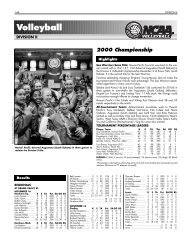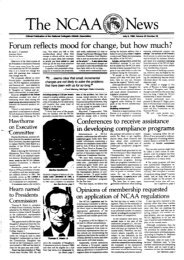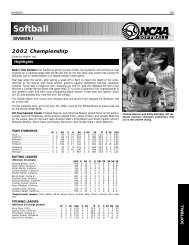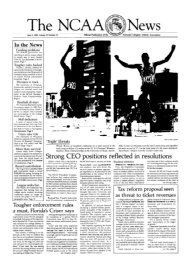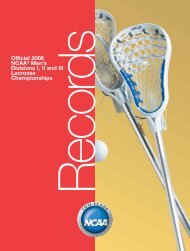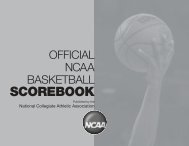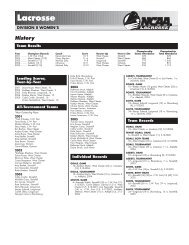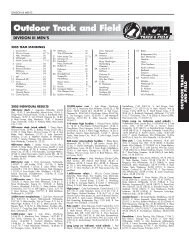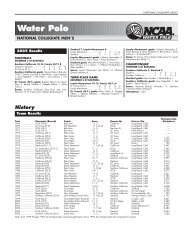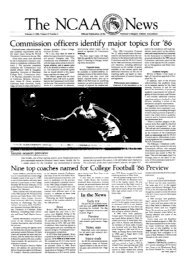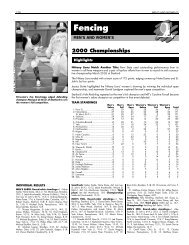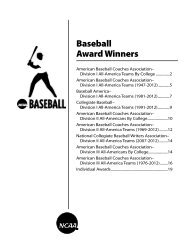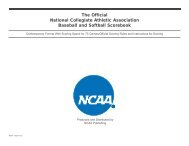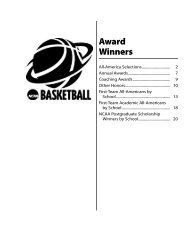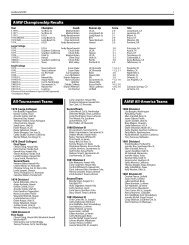Sports Medicine Handbook - NCAA
Sports Medicine Handbook - NCAA
Sports Medicine Handbook - NCAA
You also want an ePaper? Increase the reach of your titles
YUMPU automatically turns print PDFs into web optimized ePapers that Google loves.
<strong>NCAA</strong> bylaws require that the<br />
director of athletics or his or her<br />
designee disseminate the list of<br />
banned drug classes to all studentathletes<br />
and educate them about<br />
products that might contain banned<br />
drugs. The following provides a<br />
framework for member schools to<br />
assure they are conducting adequate<br />
drug education for all studentathletes.<br />
Athletics administrators,<br />
coaches and sports medicine<br />
personnel should also participate in<br />
drug-education sessions. Campus<br />
colleagues may provide additional<br />
support for your efforts.<br />
In preparation for<br />
institution drug-<br />
education programs,<br />
annually:<br />
• Develop a written policy on<br />
alcohol, tobacco and other drugs.<br />
This policy should include a<br />
statement on recruitment<br />
activities, drug testing,<br />
disclosure of all medications and<br />
supplements, discipline, and<br />
counseling or treatment options.<br />
• Review the <strong>NCAA</strong>, conference<br />
and institutional drug-testing<br />
GUIDELINE 1h<br />
<strong>NCAA</strong> Alcohol,<br />
Tobacco and Other<br />
Drug Education<br />
Guidelines<br />
August 2000 • Revised June 2003, June 2009, June 2010<br />
program policies and update<br />
handbook materials accordingly.<br />
• Include the <strong>NCAA</strong> list of banned<br />
drug classes and <strong>NCAA</strong> written<br />
policies in the student-athlete<br />
handbook.<br />
• Identify <strong>NCAA</strong>, conference and<br />
institutional rules regarding the<br />
use of street drugs, performance<br />
enhancing substances, and<br />
nutritional supplements, and<br />
consequences for breaking the<br />
rules.<br />
• Display posters and other <strong>NCAA</strong><br />
educational materials in hightraffic<br />
areas.<br />
• Include the following printed<br />
warning in the student-athlete<br />
handbook:<br />
Before consuming any nutritional/<br />
dietary supplement product, review<br />
the product and its label with your<br />
athletics department staff. Dietary<br />
supplements are not well regulated<br />
and may cause a positive drug test<br />
result. Any product containing a<br />
dietary supplement ingredient is<br />
taken at your own risk.*<br />
Tasks and Timelines<br />
for educating<br />
student-athletes<br />
By July 1:<br />
• Send out the <strong>NCAA</strong> list of<br />
banned drug classes, the dietary<br />
supplement warning and REC*<br />
information to all returning<br />
student-athletes and known<br />
incoming student-athletes.<br />
Orientation at Start<br />
of Academic Year:<br />
• Ensure that student-athletes sign<br />
<strong>NCAA</strong> compliance forms.<br />
• Provide student-athletes with a<br />
copy of the written drug policies<br />
as outlined prior.<br />
• Show <strong>NCAA</strong> Drug-Education<br />
and Testing video.<br />
• Verbally explain all relevant drug<br />
policies with student-athletes<br />
and staff:<br />
• <strong>NCAA</strong> banned drug classes<br />
(note that all related<br />
compounds under each class<br />
are banned, regardless if they<br />
21


